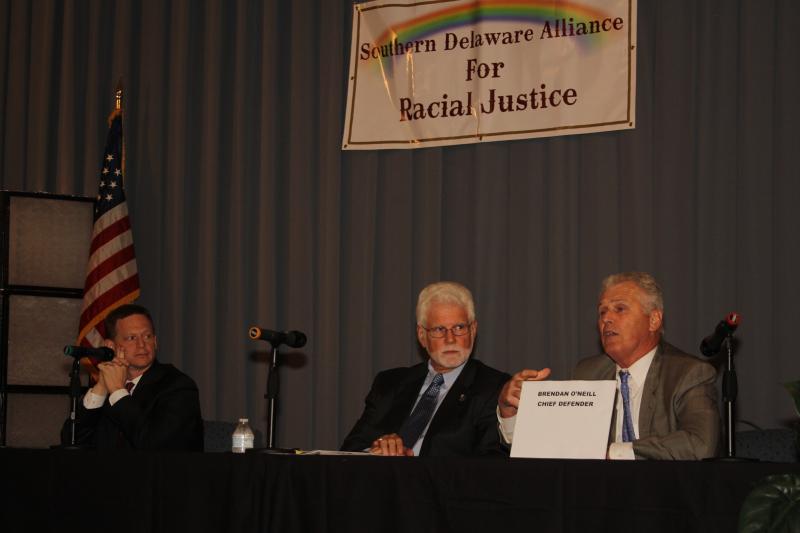Forum focuses on drugs, arrests, bias
Overcrowded jails, overcrowded court systems and the ugly consequences that come from addiction are all part of a drug problem overwhelming Delaware's justice system, says Delaware's chief public defender.
The demand for drugs is so great that no amount of money spent can stop it, he said.
“It's not about how much money we're putting into this program or that program,” said Brendan O'Neill, chief defender for Delaware. “If we could make the demand for drugs go away, we could make a lot of these problems go away.”
O'Neill and Delaware Attorney General Matt Denn faced off in a forum Nov. 15 on Delaware's judicial system, sponsored by the Southern Delaware Alliance for Racial Justice.
Denn said two-thirds of crimes committed in Delaware – from property crime and home invasions to more serious assault and murder – are connected to the state's drug trade. He said more spending is needed to counter it.
“We are not spending resources in areas that would prevent some of these things from happening, and we should be,” Denn said.
Denn called for more money for public education to include summer school and after-school programs, inmate programs to prevent recidivism and treatment for drug addiction.
“We have not yet as a state come close to effectively dealing with providing treatment opportunities to people who want to receive treatment,” he said. “That costs money, and until we do that, we're not going to be where we want to be.”
But O'Neill said pouring money into the problem isn't the answer. People of all ages, income levels and races are buying drugs on the illegal market, he said.
“Until we figure out a way to quell the demand for drugs, we're going to be dealing with this stuff,” he said. “I certainly know we can't incarcerate our way out of these problems. I don't know that we can treat our way out of these problems. In the long run we have to prevent our way out of these problems.”
Legalizing drugs would be a solution, O'Neill said, but he has little faith that Delaware lawmakers would agree.
“It's a very complicated deal, and I don't know the answer,” he told a crowd of about 60.
Lewes resident Tom O'Hagan said he disagrees with police practice that considers the number of times a person has been arrested, even if the arrest is dismissed and there is no conviction.
“I'm guilty by being brought in to the station by a policeman,” O'Hagan said. “You're seeing that in the record and using that against me in your decision-making process. That's totally unfair. And I'll bet white people don't get brought in as much, so their folder is a lot emptier. It sounds like the system is rigged.”
Denn said it is relevant if someone has been arrested multiple times, even if there is no conviction.
“If we have someone who has one conviction but has been arrested six, seven, eight other times and the charges were dismissed, that's something that in my mind is worth asking about,” he said. “But I do think that that is part of the totality of information that is relevant to the prosecutor … I don't agree that if a person has lots and lots of arrests, that for one reason or another didn't result in a conviction, that that is wholly irrelevant to a prosecutor trying to get a sense of who is this individual that I'm dealing with.”
O'Neill said arrests that don't result in convictions should not be used against a person. He also said that while he has never seen overt racism, he believes that it exists implicitly in some cases.
“It's there,” he said. “Part of the job is to expose the cop if he's not telling the truth. It doesn't happen all the time, but it does happen.”
Audience members questioned the men on hiring practices within their offices. O’Neill said finding minorities who have passed Delaware's competitive bar is difficult.
“My personal opinion is that the bar excludes too many people of all colors,” O'Neill said. But he said Delaware's difficult bar exam also ensures that only the best lawyers are working in Delaware. On a controversial note, O'Neill said the system also limits competition among lawyers in the state.
“We don't want any bad lawyers. We don't want bad white lawyers, we don't want bad black lawyers, Latino or Asian. We want good lawyers. The bar exam is a blunt tool that the system uses to sort out people who are going to be bad lawyers,” O'Neill said.
Denn said attorneys and others in his office recently set up a fund to support women of color pursuing law careers. The fund, named after Sarita Wright, a young African-American attorney who died suddenly in 2014, will help cover expenses for women studying for the bar exam, he said.
For more information, on the Southern Delaware Alliance for Racial Justice, go to www.sdarj.org.
Melissa Steele is a staff writer covering the state Legislature, government and police. Her newspaper career spans more than 30 years and includes working for the Delaware State News, Burlington County Times, The News Journal, Dover Post and Milford Beacon before coming to the Cape Gazette in 2012. Her work has received numerous awards, most notably a Pulitzer Prize-adjudicated investigative piece, and a runner-up for the MDDC James S. Keat Freedom of Information Award.






















































